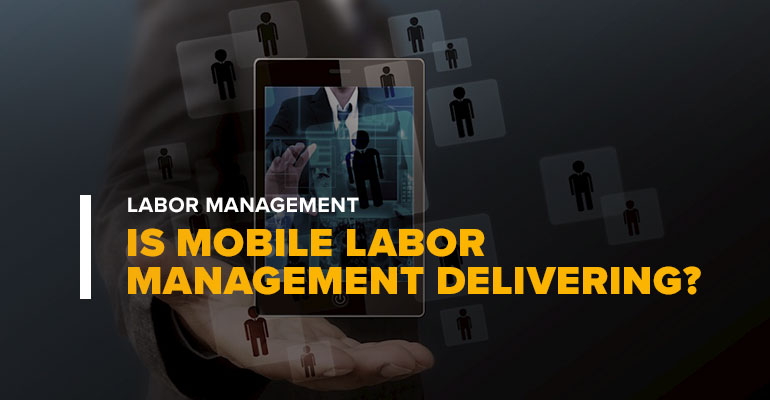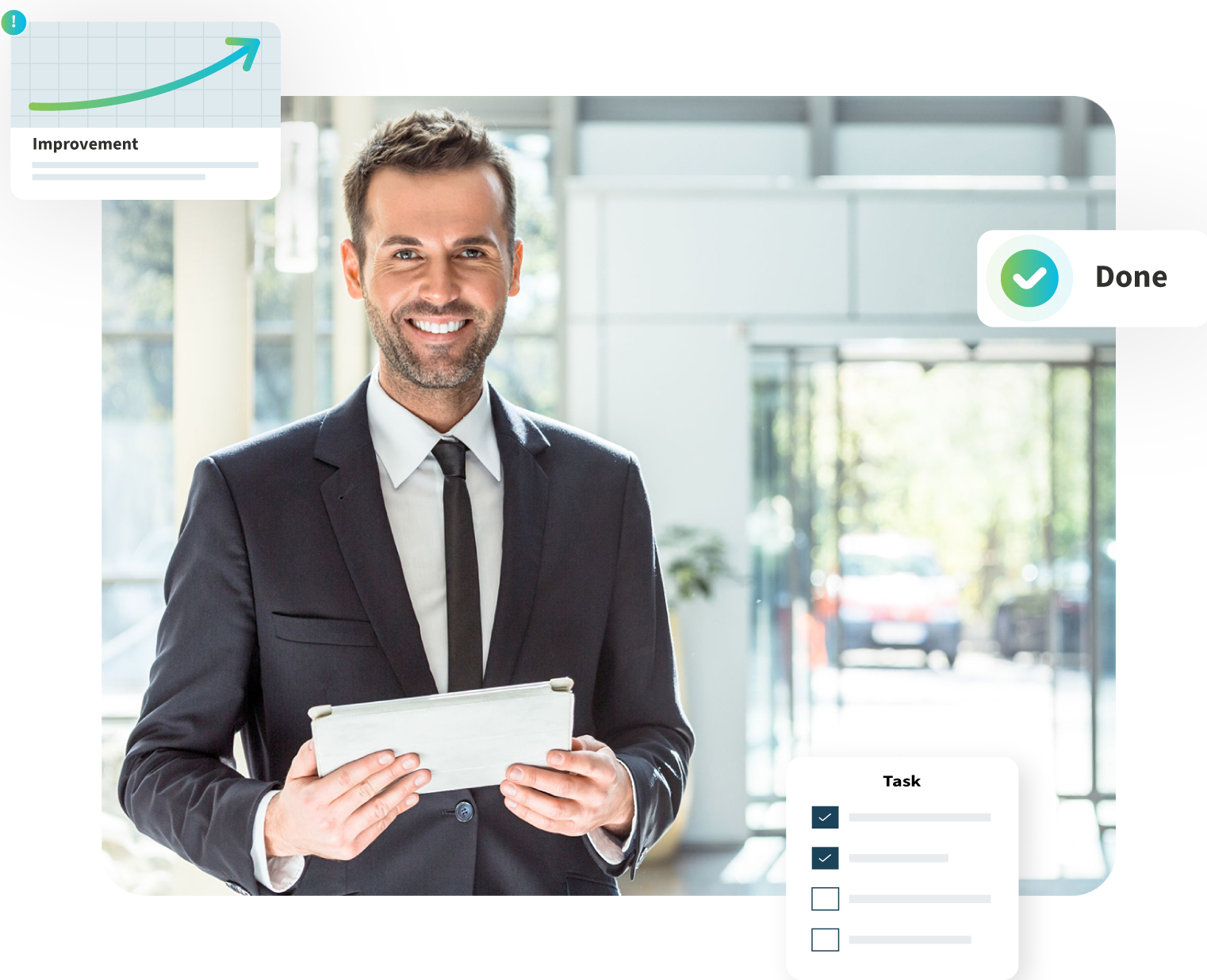September 7, 2018 - By Mark Heymann, Chairman & CEO, UniFocus - Published in Hotel Executive – It's a mobile world, both in and out of the workplace, thanks to increasingly powerful smart phones that put the power of a computer in the palm of one's hand. For millennials - the majority generation of workers, mobile technology enables the flexibility and work-life balance they seek. Now, with Gen Z on the rise, the stakes are even higher for employers to embrace mobile tools to manage and engage staff. This generation was born into a high-tech world and for them, smart phones are simply an extension of themselves. And older workers, too, increasingly rely on mobile devices to manage their lives.
It's into this environment that labor management technology companies have introduced mobile tools. These have been designed to give hotel managers the ability to streamline tasks, reduce errors, and communicate more effectively with their workers-all while spending less time at their desks and more where it matters: on the floor with their team and guests. They can approve scheduling requests, broadcast messages to nimbly staff shifts based on changing demand forecasts and stay abreast of issues, with automatic alerts to call-ins, late clock-ins, early clock-outs, approaching overtime, and more.
The same tools promise workers more control over their own schedules. They can accept, swap and drop shifts on the fly, review their schedules at any time, call in sick, request time off, and receive timely responses to their requests. Scheduling, then, becomes a more collaborative process, resulting in a more productive, engaged workforce.
That said, some hotel operators have been slow to embrace mobile and advanced scheduling tools. There's a comfort to the familiar, and managers who have relied on spreadsheets to schedule their staffs for years, and simply post shifts on a wall, can be resistant to the learning curve inherent in any new process.
"My message would be don't wait-it's important," said Vincent Hubrich, director of productivity improvement at White Lodging, a leading hotel ownership, development and management company with nearly 100 premium branded hotels and 30 restaurants in 19 states. "From a workforce management perspective, there's an expectation to have a mobile app that allows workers to be flexible with schedule options, time, being able to trade shifts, and so on. The longer an organization waits to deploy something, they'll always be a step behind and will not have a competitive edge. There are growing pains that go with any implementation and change, so the earlier they get it done the better."
In late 2015, White Lodging implemented a labor management system, including a mobile app. "One of the strategic alignments behind that decision was to ensure that not only did we give operations leaders a tool to effectively schedule and manage labor, but that the associates could also participate in the process to gain additional flexibility over their schedules. Now, not only do associates have fingertip access to their schedule; they also have accountability into their request offs and visibility in follow up and shift trades," Hubrich said.
JW Marriott Austin was the first White Lodging hotel to implement the system, "just to make sure we had a very stabilized platform before scaling it uniformly across the entire portfolio," said Hubrich. "We worked out interface details in transferring data, how our users interact with it, and developed some best practices." Six additional hotels followed later that year and, in the third quarter of 2017, it began scaling to the entire portfolio, finishing up in the first quarter of 2018. This pace allowed White Lodging to ensure consistency across all of its hotels.
Today, Hubrich said, about 800 leaders across the portfolio are using a labor management system, along with about 50 percent of the workforce. "Thus far the comments from hourly team members and leadership have been generally positive. From an engagement standpoint, they feel much more part of the process."
Hubrich admitted to some initial reticence with managers who were accustomed to scheduling with spreadsheets, but said that as time has progressed, those same managers are seeing the benefits. "We've started to hear feedback like, 'My housekeepers like seeing if their request is approved or not. They like getting notification that their schedule is done and don't have to have a friend take a picture of it.'"
To Hubrich, "The best thing about it is when we train an operations manager at Hotel A and later they're promoted within the hotel or move to Hotel B, it's the exact same tool, with the same reporting and methodology that goes into running it. They don't have to learn new spreadsheet formulas. In the hospitality arena, there are people looking to move up quickly. There's constant changes, so carrying consistency throughout is important not just for owners but associates as well."
What follows are the experiences and insights of property-level leaders at eight White Lodging hotels about the move to mobile.
JW Marriott Austin: Empowered Employees
Anne Tabakian, general manager of one of White Lodging's restaurants, Corner, has been using a mobile app for about two years. "Programming the employees' availability and being able to move shifts around from week to week when writing the schedule has been a time saver compared to our previous spreadsheet-based scheduling," she said. "The distribution of the schedule is definitely more efficient. Previously the managers kept a contact list with every employee's email address, which we shared and constantly updated, and schedules were sent manually. Having each employee individually responsible for their schedule and the fact that they see it immediately when we post it is a huge time saver."
Workers feel they have more control over their schedule, with more visibility, including the ability to see others' schedules. "They know who to ask when they are looking for shift coverage."
Courtyard by Marriott Chicago Downtown/ Magnificent Mile: No More Lost Requests
According to general manager Robert Brand, the hotel implemented a labor management system first in the front office, then rapidly expanded into food and beverage (F&B), housekeeping and all other areas. After an early struggle organizing request offs and school schedules, the system "is becoming more and more a part of our DNA," said Brand. "It's very popular now, especially with F&B, for request offs and shift trades. It makes it very easy to communicate needs and the employee does not need to wait several days for the manager to get back to them. It happens very quickly."
Before going mobile, Brand said, managers had to hunt down employees to follow up on requests for days off, or to ensure that all employees called in for their schedule. "This was a constant headache for managers and things would get forgotten or hidden in a stack of paperwork, causing call-offs or disgruntled employees on the floor interacting with our guests." Now, schedules are sent to employees automatically and request offs handled quickly.
One area where the difference is particularly dramatic is F&B. "The F&B group is the most complex and many of the staff go to school or have a second or even third job. They need to know within an hour if they can change a shift or not." Having a mobile app gives them the ability to find their replacement, and all the manager has to do is see it come through on their phone and approve it.
Brand sees signs of improved engagement as well. "Request offs and shift trades were a hot topic for our property. Our employees are much happier now that they control some of their own schedule and have flexibility. There was some frustration in some areas due to consistent mistakes. This system has helped engage employees and managers, and even have more fun when they are working together."
Hyatt Place Austin/Downtown: A Time Saver
Time savings is the biggest benefit to this Austin hotel, according to assistant general manager Justin Payne. "All areas seem to have benefited in some aspect of time efficiency. Schedules are easier to organize and assemble. The time off request process, however, is possibly the largest win in terms of cutting the amount of time and improving the level of communication. Associates are able to submit a request anytime, anywhere and are able to check the status of it similarly. With associates having access to emails, texts and notifications pushed to their device, the time it takes for an entire team to receive communications is cut drastically."
Time saved in creating schedules is offset somewhat by "some extra time" involved in additional data entry and forecasting functions. However, Payne says the payoff is worth it. "This is, after all, to assist in a more efficient breakdown of how time is being spent across the property when used correctly."
Management's ability to respond more quickly and directly to associate requests is another important gain, says Payne. "This is especially important when scheduling and planning for larger teams that may have completely different hours and days. It is especially helpful that they can determine their preference for alerts and can have access to it anytime, from anywhere."
Hampton Inn & Suites and Homewood Suites Teaneck Glenpointe: Greater Engagement
For Matthew Konrad, dual assistant general manager of these two New Jersey hotels, mobile scheduling means being able to handle time off requests far in advance, a big advantage to associates who have outside obligations like serving in the Army Reserves or sharing custody of a child. "This allows them to alert us a year in advance of all time off requests. Before, I would limit request offs to no more than three months in advance due to my worry of losing track of the sheets of paper, email or text. Now it is all in one spot."
Konrad lists a litany of communication forms managers formerly had to juggle--paper schedule restrictions, paper request offs, emails, text messages and phone calls-in order to complete a schedule. With everything now streamlined through one app, communications between managers and associates are easier and more effective. In addition, "Associates now have much more control of their schedule in terms of seeing it immediately and being notified of its approval. They no longer have to wait for an email to come through or for someone to text out a picture of the schedule." Konrad says this has led to greater employee engagement.
Courtyard & Residence Inn Austin Downtown/Convention Center: A More Competitive Profile
Since implementing a labor management system in April 2018, assistant general manager Hank Reilly reported, "It has greatly reduced the amount of time managers spend in the planning and writing stages of the schedule process each week. Rather than having to work out of multiple file templates for forecasting and schedules, our managers get all the data needed in one area. We have found that the more work we can put into creating appropriate standards, the easier life is from a scheduling standpoint."
According to Reilly, not only has the mobile app increased engagement but it has also helped the hotel compete in a scarce labor market. "Our schedules go out at 12 p.m. sharp every week," he said. "Associates know that they can count on that regardless of what department they work in. Using the functionality of the app also helps keep us relevant in the competitive market for associates."
Aloft Louisville Downtown: Inter-departmental Cohesion
It's not uncommon at Aloft Louisville Downtown for staff members to split their hours between more than one department. Director of services Andrea Jackson explained, "Working in a hospitality environment with multiple departments, we have employees who are cross trained in more than one area. It is very helpful to see all request offs and who would be available for every department in one place, so that we know who can cover shifts in which area."
Six months after implementing a mobile app, Jackson has seen more enthusiasm and engagement among the hotel staff. "All the associates who have gone through orientation get excited to hear about using a central platform for scheduling and knowing that they can view everything on their phones whenever they want."
Fairfield Inn Indianapolis Downtown: Greater Visibility
Fairfield Inn Indianapolis Downtown has been using a mobile system for about a year. According to Kevin Shannon, housekeeping manager, a benefit to his department is greater visibility. "The mobile app easily allows associates to see each other's schedule so they can switch days without having to ask to see the schedule," he said, adding, "They can see if their requests are approved or denied."
Employees feel they have more control, said Shannon, because they can view their schedule anytime, and don't have to call in to find out when they're scheduled to work. The system also allows for better tracking of request offs, a benefit to both managers and staff. "It compiles information that used to be in many separate spreadsheets into one easy-to-read application."
General manager Brett Ociepka believes going mobile has had an effect on engagement as well. "Hourly associates care about their schedules, so to have access to it and request offs 24/7, it makes a positive impact."
Sheraton Erie Bayfront: Mobility
"I think about the time saved by the associate who would normally travel to work just for his or her schedule," said Justin Weeks, assistant general manager of the Pennsylvania hotel. "Now they have the ability to see their schedule instantly, from anywhere." What's more, Weeks said, the ability to swap, pick up and give away shifts after the schedule is posted makes employees feel like they are in control of their time.
Communication between managers and associates is now streamlined. "The schedule is a top priority. The associates' ability to request off, change availability, pick up shifts, etc., and the managers' ability to approve and reject requests so quickly and sometimes instantly makes the communication simple and clear." This has freed managers to spend more time with their staff and guests, explained Weeks. "Less time spent behind a desk working on schedules equals more time on the marble."
For White Lodging, and a growing number of forward-looking hospitality organizations, the move to mobile has borne out the technology's promise: that an effective scheduling process coupled with timely communication and transparency, based on a mobile platform, heightens performance of the entire team.






